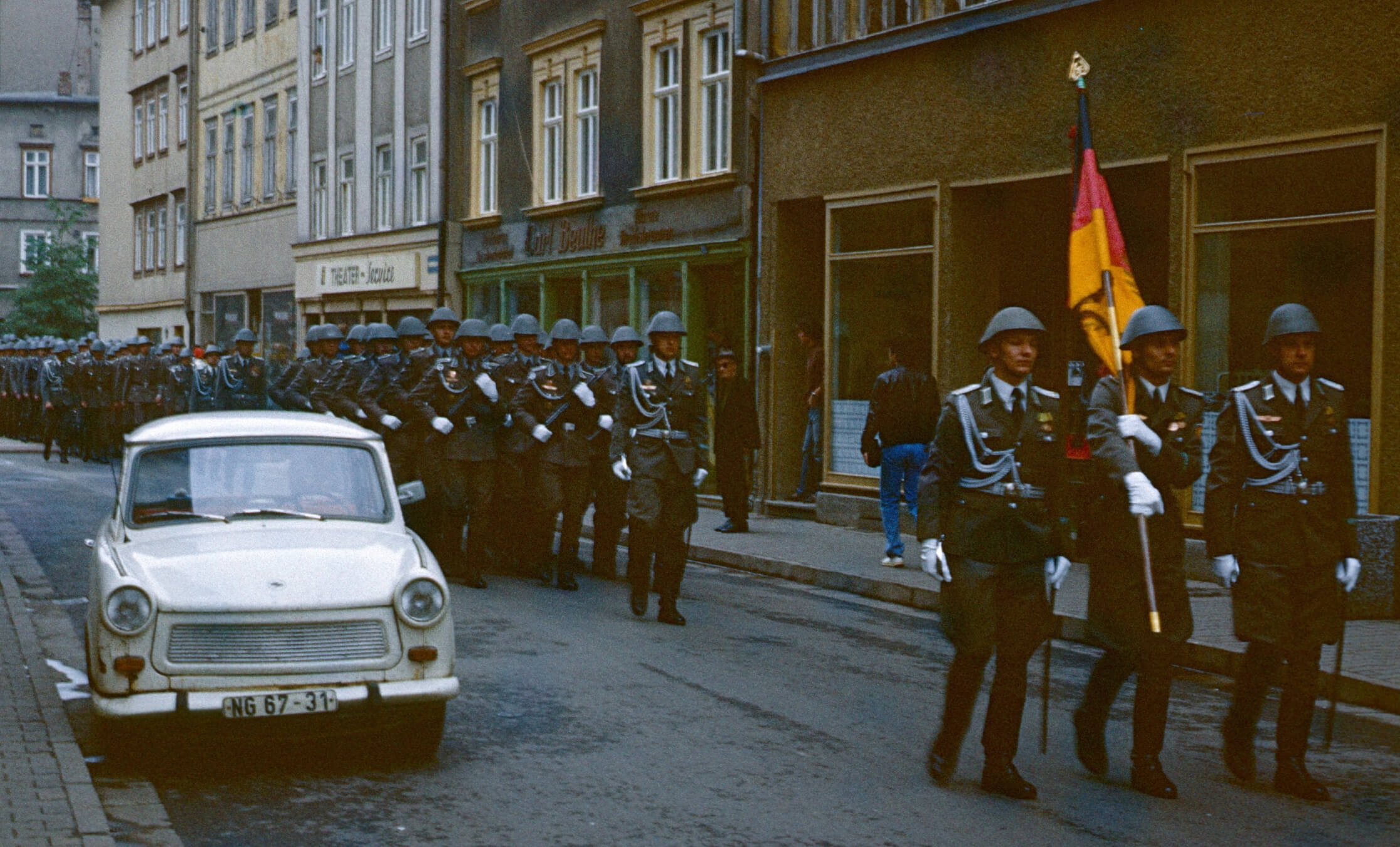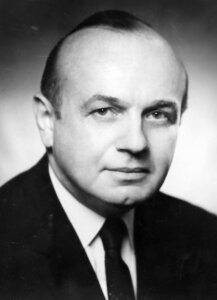50 years ago East Germany gained admission to the UN over one objection — Israel’s
Israel’s ambassador backed West Germany but said East Germany did not deserve to join the family of nations

East German soldiers march through the state of Thuringia five years after East Germany gained admission to the United Nations. Photo by atlantic-kid/iStock

A half-century ago on Monday, the United Nations voted to admit West Germany and East Germany as members. There were only two dissenting voices — Guinea’s opposition to West Germany, and Israel’s against East Germany.
The Jewish state expressed its strenuous objection because of East Germany’s refusal to accept responsibility for the Holocaust.
“It was only three decades ago that 6 million human beings were systematically annihilated merely because they were Jews,” said Israel’s representative to the UN, Yosef Tekoah, ahead of the General Assembly vote on Sept. 18, 1973. “Two million Jewish children were mercilessly put to death in gas chambers and crematoria. One third of the entire Jewish people were massacred.”
Germany bore a moral and legal responsibility for this genocide, Tekoah said, adding that West Germany had consistently recognized “this heavy responsibility” and made a serious effort to make amends to the Jewish people.
But East Germany, he accused, had made no attempt at all and “compounded the gravity of this attitude by giving support and practical assistance to the campaign of violence and murder waged against Israel and the Jewish people by Arab terror organizations.”
Tekoah was heard, but swayed no country to Israel’s side. East Germany’s admission to the UN was approved by the General Assembly without a request for a recorded vote. German officials on both sides of the Iron Curtain exulted. Western democracies also heralded the news.
“The admission of the Germanys was described here as a major achievement along the path of improving East‐West relations and also as a clearing of the last important hurdle toward the goal of membership for all nations,” The New York Times wrote at the time.
Denying its Nazi history
East Germany for many years denied that it had any responsibility for the Nazi government, arguing that its Communist leaders opposed Hitler. Israel continued to press East Germany to own up for its liability. In February 1990, the government finally agreed to pay reparations to Jewish victims of the Holocaust, but by the end of the year the two Germanys had reunited.
Jeffrey Herf, an emeritus history professor at the University of Maryland in College Park, wrote in a 2016 Commentary story that an “11th commandment” prevailed in West German politics after the Holocaust: “Do not kill or harm any more Jews and do not help anyone else to kill or harm any more Jews, including the citizens of the state of Israel.”
“East Germany was a different story,” Herf wrote in the piece, which drew from his 2016 book, Undeclared Wars with Israel: East Germany and the West German Far Left, 1967–1989. “It too had been part of the Third Reich, and its people and leaders were as morally shadowed by the evils perpetrated in their land as anyone in the West. But it was hostile to the state of Israel from the time of its founding in 1949 to its own demise” four decades later. Herf cited East Germany’s military aid and training to Arab states and Palestinian organizations that were at war with Israel.
An anti-Israel posture
During the Cold War, the Communist nations of the Eastern Bloc, including East Germany, allied with Arab nations against Israel, while the United States was a firm backer of the Jewish state. Herf wrote that when Soviet leader Joseph Stalin turned against Israel in 1949, and “anti-cosmopolitan” purges followed in the 1950s, “the Soviet bloc as a whole became Israel’s enemy. Yet East Germany took an even more passionate and prominent role in the anti-Israeli cause than did its fellow satellites in Poland, Hungary, and Czechoslovakia.”
He wrote that in September 1973 — the same month it was admitted to the United Nations — East Germany became the first of the Soviet bloc states to permit the PLO to open an office in its capital.
“This decision took place when the PLO, following its Charter of 1968, was openly engaged in ‘armed struggle’ with the purpose of destroying the state of Israel. It demonstrated the vanguard role and initiative that the East German Communists brought to the anti-Israeli cause,” Herf wrote.
A turnaround
In 1975, two years after East Germany was admitted to the U.N., it was part of a 72-35 General Assembly majority that voted for an Arab-inspired resolution which defined Zionism as “a form of racism and racial discrimination.” The Soviet Union took the lead in pushing through the anti-Zionist language.
In an editorial at the time headlined “Shame of the U.N.,” The New York Times condemned the vote.
“The unholy alliance of Communist and Arab Governments that pushed through the General Assembly the odious resolution equating Zionism with ‘racism’ was, in effect, challenging the very right to existence of Israel, a member state created by act of the United Nations itself,” the Times wrote. The newspaper blasted Communist nations for joining “in this degrading move that only reflects their endemic anti‐Semitism.”
In 1991, the U.N. overwhelmingly voted to repeal the statement, 111-25, with the Soviet Union co-sponsoring the repeal resolution. By this time, East Germany was no more, and the newly reunified Germany voted for repeal.
A message from our Publisher & CEO Rachel Fishman Feddersen

I hope you appreciated this article. Before you go, I’d like to ask you to please support the Forward’s award-winning, nonprofit journalism so that we can be prepared for whatever news 2025 brings.
At a time when other newsrooms are closing or cutting back, the Forward has removed its paywall and invested additional resources to report on the ground from Israel and around the U.S. on the impact of the war, rising antisemitism and polarized discourse.
Readers like you make it all possible. Support our work by becoming a Forward Member and connect with our journalism and your community.
— Rachel Fishman Feddersen, Publisher and CEO





























